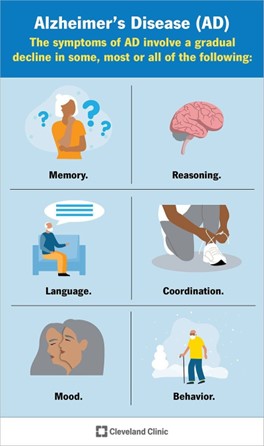A nurse is assisting with the plan of care for a client who has Alzheimer's disease. Which of the following actions should the nurse recommend for the plan of care?
Encourage the client to talk about current events.
Give directions using simple phrases
Orient the client to time and place twice per day
Rotate assistive personnel to help the client with ADLs
The Correct Answer is B
b. Give directions using simple phrases.
The correct answer is b. Give directions using simple phrases.
Explanation:
When assisting with the plan of care for a client with Alzheimer's disease, it is important to consider their cognitive impairments and provide appropriate interventions. Giving directions using simple phrases is recommended because it helps the client beter understand and follow instructions. Complex or lengthy directions can be confusing and overwhelming for individuals with Alzheimer's disease. Using clear and concise language can enhance communication and facilitate the client's ability to engage in activities of daily living.
Explanation for the other options:
a. Encourage the client to talk about current events: While social interaction and engagement are beneficial for clients with Alzheimer's disease, their ability to comprehend and discuss current events may be limited due to cognitive impairments. It is important to adapt communication to the client's cognitive abilities and interests.
c. Orient the client to time and place twice per day: Frequent orientation to time and place can be helpful for clients with Alzheimer's disease, but the specific frequency should be based on the individual's needs and preferences. Some individuals may require more frequent orientation, while others may find it overwhelming. The plan of care should be individualized to address the client's specific needs.
d. Rotate assistive personnel to help the client with ADLs: Consistency and familiarity are important for individuals with Alzheimer's disease. Rotating assistive personnel frequently may disrupt the client's routine and cause increased confusion and agitation. Whenever possible, it is best to maintain a consistent caregiving team to provide familiarity and establish a therapeutic relationship with the client.
In summary, giving directions using simple phrases is an appropriate action when assisting with the plan of care for a client with Alzheimer's disease. This approach promotes effective communication and enhances the client's ability to understand and follow instructions.

Nursing Test Bank
Naxlex Comprehensive Predictor Exams
Related Questions
Correct Answer is C
Explanation
c. Periorbital edema.
Explanation: Acute glomerulonephritis is an inflammatory condition affecting the glomeruli of the kidneys. It is commonly characterized by periorbital edema, which is swelling around the eyes. This occurs due to fluid retention and impaired kidney function. Other common manifestations of acute glomerulonephritis include hypertension (increased blood pressure), dark or tea-colored urine (hematuria), decreased urine output, and signs of fluid overload such as edema in the hands, feet, and face.
Option a, decreased blood pressure, is not typically seen in acute glomerulonephritis. Instead, hypertension is a common finding due to fluid retention and increased blood volume.
Option b, pale yellow urine, is not expected in acute glomerulonephritis. Instead, urine may appear dark or
tea-colored due to the presence of blood (hematuria).
Option d, increased urination, is not a characteristic finding in acute glomerulonephritis. Instead, there is often a decrease in urine output or oliguria.
It is important to note that individual presentations may vary, and the nurse should consider the complete clinical picture and the child's specific symptoms when assessing for acute glomerulonephritis.

Correct Answer is D
Explanation
The statement by the parent that they can place a rolled towel on each side of their newborn's head until he can hold his head up indicates an understanding of the teaching. This is a safe and appropriate way to provide support for the newborn's head while in a car seat.
a) Securing the seatbelt across the newborn's lap is not safe. The seatbelt should be positioned across the newborn's chest and over their hips.
b) Moving a child to a booster seat when they weigh 20 pounds is not safe. Children should remain in a rear-facing car seat until they are at least 2 years old or until they reach the highest weight or height allowed by the car seat's manufacturer.
c) Turning the car seat forward-facing when the child is 10 months old is not safe. Children should remain in a rear-facing car seat until they are at least 2 years old or until they reach the highest weight or height allowed by the car seat's manufacturer.
Whether you are a student looking to ace your exams or a practicing nurse seeking to enhance your expertise , our nursing education contents will empower you with the confidence and competence to make a difference in the lives of patients and become a respected leader in the healthcare field.
Visit Naxlex, invest in your future and unlock endless possibilities with our unparalleled nursing education contents today
Report Wrong Answer on the Current Question
Do you disagree with the answer? If yes, what is your expected answer? Explain.
Kindly be descriptive with the issue you are facing.
